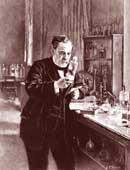Father of Microbiology

French chemist and biologist
Louis Pasteur died by day in 1895. He made numerous important discoveries and was the founder of microbiology.
In 1847 he studied physics and chemistry in Paris, where he entered. He observed that dissolutions of natural organic compounds diverted polarized light to the right or left, while placing synthetic organic compounds in the dissolution did not produce rotation. From these studies he concluded that organic molecules can be isomers, that is, that, being the same composition, they are a mirror image of the other.
In 1854 he went to work at the University of Pasteur Lille. There the practical problems of the regional industry, especially alcoholic beverages, were investigated, and Pasteur began to investigate the fermentation process. In the fermentation process it showed that alcohol is produced by yeast and that the substances that membranes the wine (acids) were related to the presence of bacteria. The acidification of wine and beer were then serious problems and Pasteur gave them the solution: heating the initial solutions to eliminate bacteria. He proposed to do the same for milk, which is pasteurization.
Pasteur's proposal that the microorganisms of wine or body were not produced spontaneously, but entered the environment, had great controversy with the French biologist Felix Pouchet and the English bacteriologist Henry Bastion. After years of discussions, Pasteur highlighted his theses and advanced in microbiological research.
Pasteur studied silk disease, discovered streptococcus and staphylococcus, investigated the origin of various infectious diseases and synthesized the rabies vaccine.
Buletina
Bidali zure helbide elektronikoa eta jaso asteroko buletina zure sarrera-ontzian











